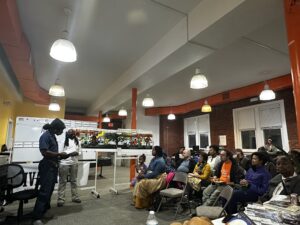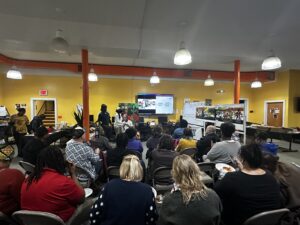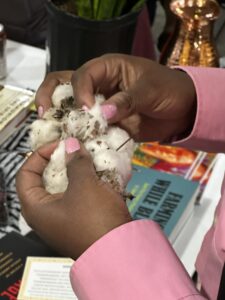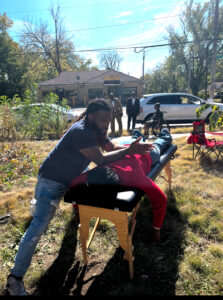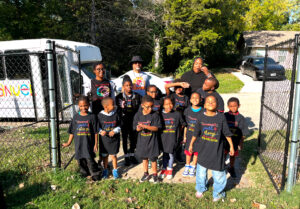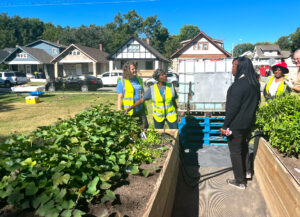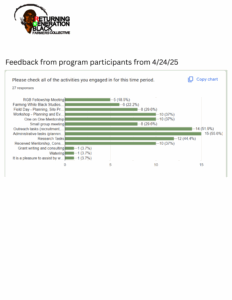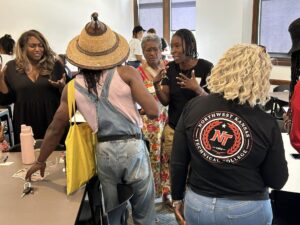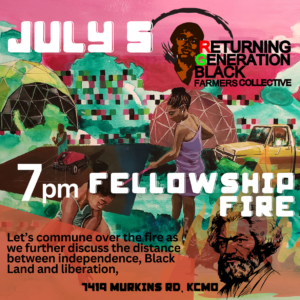Progress report for LNC22-472
Project Information
The Black Emancipatory Agriculture Asset Map and Returning Generation Black Farmer mentorship program will use participatory action research, participatory GIS and innovative arts-based knowledge translation of traditional ecological knowledge to improve Black Food Sovereignty in the Kansas City Area.
The dispossession and displacement of traditional knowledge that accompanied the loss of Black farmers has led to the negative health impacts experienced today. Luckily, some remaining knowledge has survived in collective memory. Historically-underserved communities have always experimented with various methods of production, gathering knowledge, which they then share with neighbors. This methodology provides a process by which to encourage the adoption of agroecological practices among Black farmers in the Kansas City area is built around this legacy.
Historically underserved Black farmers have relied on ingenuity and creativity to cope with structural barriers. Because of this experience, the sensations, perceptions, imagery and problem solving capacities are an essential part of how Black farmers navigate and relate to place. AgroArt will create public art presentations and online engagement visualizing a community cognitive, or mental map of the attitudes, assumptions and aspirations of social sustainability and food sovereignty within historically underserved communities.
Sankara Farm/AgroArt, and Lincoln University Cooperative Extension, will utilize participatory action research methodologies paired with farmer mentorship driven and led by Black farmers to increase the numbers of Black Farmers embracing Agroecological practices and contribute to the production of new knowledge, and reveal traditional ecological ways relating to land; including responsibility to the community and environment.
The Returning Generation Black Farmer to Farmer mentorship program combines Lincoln University Cooperative Extension Services and experienced Black farmers in the Kansas City area to mentor Black farmers in agroecological production methods. Black Farmer focused participation action research will guide ongoing studies in Agroecology, farm field days, and workshops to identify community expertise and interest in Black agrarianism and train up to 10 farmers in, culturally relevant and sustainable agroecological practices to enhance local Black Food Sovereignty. The program will provide employment opportunities for Black farmers through paid internships, and compensating people for their time resulting in an increased number of skilled Black Farmers in the Kansas City area, improving financial outcomes and enhancing social sustainability in Black communities.
These methodologies and innovative actions will improve the numbers of skilled Black Farmers and increase their awareness of Agroecological practices, therefore improving financial viability for the historically-underserved yet culturally rich Black farmers in the Kansas City area.
Learning
- Identify the areas with potential to support local Black farmers’ food production and distribution. It will increase the knowledge and attitudes of food sovereignty with Black farmers
- Increased awareness of the cultural, nutritional, and agroecological value of Traditional Agricultural practices to African American communities.
Action
- Engage Black farmers through on-farm demonstration, collective study, and mentorship leading to an increase in the adoption of agroecological practices and knowledge of traditional agricultural practices.
- Create returning generation farmer training infrastructure, utilizing Arts-Based knowledge translation; culturally relevant curriculum and mentorship. Increased access to culturally relevant outreach materials and increased adoption of agroecological practices.
The Returning Generation Black Farmer Mentorship program involves:
6 Mentor Farmers
Izula Jade Maximillen (She/They/WE/YeYe) Born by the river in Kansas City, Missouri, in the heart of occupied Missouria-Otoe territory, Izula's journey of nurturing food sovereignty within Black, African, and Indigenous Diasporic communities has spanned over 2 decades. As a student of Traditional Indigenous Midwifery, Izula's passion intertwines with being a co-land steward alongside kindred spirits, at Sankara Farm, on a 27-acre urban family farm, pulsating with AgroArt, agroecology, and agroforestry. Here, they honor the diverse legacies of songs, stories, and cultures woven into the very essence of agriculture and Black Agrarianism
Webster Davis, Triple D Produce
Webster Davis is the owner of Triple D Produce, located two miles west of Auxvasse, Missouri. He has worked with various FFA groups to secure vegetable starts and encourage youth to pursue food production as an occupation. He worked with Lincoln University as a mentor for the Minorities in Agriculture, Natural Resources and Related Sciences (MANRRS).
Mike Pearl, Pearl Family Farms
In 1813, Milton Paxton was born a slave in Kentucky. Milt was a farm laborer for the Paxton family. Around 1839, Milt was brought to Platte County, MO to work on their plantation. It was Milt’s dream to someday own his farm. However, that dream was deferred. Milton, after being freed, changed his name from Paxton to Pearl. Milton had a son named David Pearl that was born a slave in 1852. Dave was eventually freed. In those days, it was common for slaves to make extra money by exceeding their quota of cutting and bundling hemp. David worked and saved enough to buy 87 acres in 1890.
Ryan Tenney, Sankara Farm
A returning generation (Agri)cultural worker, co-land steward at Sankara Farm and founder of community-based arts organization, AgroArt which specializes in creative socio ecological intervention strategies. Currently I am founder and Co-land Steward, Programming, Education and Technical Director of Sankara Farm and Director of AgroArt. following in the footsteps of George Washington Carver, shifts perspectives and raises awareness of soil biology. I am designing and building sensor modules that deploy microcontrollers to monitor compost and aim to inoculate our territories with beneficial mycorrhizal fungi and fungally active compost.
Staroyce Nealy, Global One Urban Farming
Global One Urban Farming's mission is to grow organic vegetables and fruit, distribute them free to thousands of individuals within the Inner City Kansas City Urban Our vision is to teach our fellow neighbors, adults and youth proven methods of contributing to the revitalization of our neighborhoods by teaching the greenhouse process of producing plants from seed to final harvest. We also are building self-sustaining, peaceful, and healthy lifestyles by distributing 25,000 pounds of organic produce free each season to 1200 residents in our USDA defined food desert communities. Global One Urban Farming provides garden workshop activities, introductions to the beneficial preparation of nutritious organic vegetables as a means of building community and providing healthy diet alternatives in hopes to raise health levels in our USDA defined food insecurity communities. We host events throughout the year called Kansas City Jazz in the Garden with Live Jazz, Therapeutic massages, food, fun and games. Global One Urban Farming provides access to vegetables that may not be available in the community otherwise. We now have supporters and partnerships from Jefferson City to City Hall. Our volunteer groups and sponsors continue to push us to be able to increase production of vegetables to distribute free to more residents in need. We continue to gain collaborations throughout our community and are being the change we want to see
Mike Roland, Ophelia's Blue Vine Farm
Founded in 2014, Ophelia’s Blue Vine Farm strives to bring fresh herbs to the Kansas City metro. Our Grandmother, Miss Ophelia, is the inspiration behind everything we do. As a single Black mother, she raised 6 children and put them through college. Two of which went on to play in the NFL. It’s safe to say she never settled for second best. That’s why we don’t either. We never let a pack of herbs leave our greenhouse if we don’t think Miss Ophelia would call it excellent. We are proud to call Kansas City’s 18th & Vine District home. Our urban greenhouse is nestled among historic spots that helped bring jazz music to the world. We take pride in our neighborhood and want to build up the community that surrounds it.
Daniel Robinson, Brush Creek Gardens
Daniel Robinson is the owner of Brush Creek Gardens and is an urban grower of a variety of fresh produce and vegetables. He spent a couple of years researching and developing infrastructure in the non-profit agricultural sector, and currently a member of a few professional organizations including a stint with MU Extension. Daniel has been primarily focused on advocacy of land justice, equity, access and food sovereignty in our food system and enjoys empowering others in the journey for food sovereignty.
